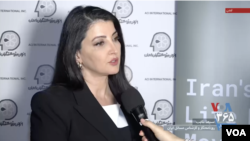A prominent Iranian diaspora journalist has spoken exclusively to VOA about her horrified and defiant reaction to learning last week that she was the target of an alleged Iranian assassination plot in London a year ago.
Sima Sabet, a London-based former TV presenter for Persian news network Iran International who left the channel in August, was one of two Iran International presenters targeted in the foiled plot whose details were published by Britain’s ITV News on December 21.
ITV reported that agents of Iran’s top military force, the IRGC, offered $200,000 to a people-smuggler to try to kill Sabet and Fardad Farahzad late last year in the British capital, where Iran International is headquartered.
The British network said the plot was foiled because the people smuggler was a double agent who shared recordings of the plotters with a Western intelligence agency as well as with ITV. The network added that "multiple officials" verified the man’s account.
A spokesperson for the Iranian Embassy in London, Seyed Mehdi Hosseini Matin, rejected the report as "unfounded" in a post on the X platform.
Sabet discussed her reaction to the foiled plot, how Iran International has handled the issue and how she intends to continue her work in this week’s edition of VOA’s Flashpoint Iran podcast.
Iran International spokesperson Adam Baillie, responding to a VOA request for comment about Sabet’s interview, said in an email that his network helped to facilitate an ITV interview with Sabet as part of ITV’s reporting about the plot.
"Sima resigned from the channel last August, and we continue to wish her well in whatever paths she follows," Baillie wrote. Regarding Farahzad and the network’s other staff, he said their security "remains our priority consideration at all times, whether in the field or in the newsroom or at home."
In a Friday statement to VOA, the U.S.-based Committee to Protect Journalists said Tehran has a long history of targeting Iranian journalists living overseas and their Iran-based family members in reprisal for their work. "CPJ has previously called on authorities to investigate threats and attacks, and to provide journalists with adequate protection. They should not have to live in fear just for doing their jobs," the media rights organization said.
The following transcript of Sabet’s December 24 interview has been edited for brevity and clarity.
VOA: After ITV invited you to their office on December 21 and played for you the recordings of the plotters talking about harming you and your colleague, how did you feel?
Sima Sabet, independent Iran analyst: It was awful. It is not easy to see how close [the plot] was and how they were planning to kill me. So I knew that they were trying to silence me. And if I had known about it [at the time], would that have changed anything [for my work]? No, definitely not. But at the same time, listening to people who are trying to kill you without knowing you and who are asking for God's help [in doing that] is not easy.
VOA: How has this affected your life in the days since you discovered the full extent of this plot?
Sabet: I am more motivated. I have more reasons to work harder, because I know that I was effective in exercising my responsibility as a journalist. So even though I do not present that [Iran International] program anymore, I am still continuing to work as an independent journalist. I make sure that I will not be stopped by these threats. By no means can I be scared by this. I always knew that I am dealing with a very dangerous government. I knew that the Islamic Republic of Iran is a country that by no means is bound by international laws and human rights.
VOA: Can you share why you left Iran International and what kind of work you are doing now?
Sabet: I am working as an independent journalist, writing for media outlets such as [Washington-based] The Hill. I also have a Ph.D. in politics. I am an Iran expert. So, I am exploring different opportunities.
I would like to step out of the Persian media world, in order to have a wider international audience. What I realized is that Iranian journalists such as myself who live in the West are lacking a proper communication with media outside of the Persian-language world.
There are a few voices who talk about Iran [in the non-Persian media world], but they do not reflect the diversity of political opinions [of Iranians]. I believe that is a very important point to address and I am working on it.
During the last year, the Iranian government tried to suppress news [about its crackdown on dissent in which] hundreds of people were killed, thousands were imprisoned, many journalists were jailed, people were tortured and raped. I also think the extent of this needs to be better reflected in the outside world.
VOA: What is your view of how Iran International, your former employer, has been trying to keep its journalists safe and continue its mission?
Sabet: I am happy with the way they are covering [the assassination plot]. It is good that they shed light on the extent of the threat that I was experiencing as a journalist.
After the ITV report was aired on the evening of December 21, no one from Iran International talked to me about it. But I could see that I was part of Iran International’s reporting and headlines about what was happening, which is good.
VOA: What do you think Western governments can and should do to keep journalists like yourself safe?
Sabet: I think that I and anyone else dealing with news about Iran needs protection by the police and also by the governments of the countries in which we are living. I am a British national. I do not have an Iranian passport. I am not allowed to go back home [to Iran]. If I go, God knows what would happen to me. But London is my home, and I want to be safe here. So a little bit of coordination, protection and support will preserve our freedom of the press and freedom of speech. It will enable us to do our job and feel safe and not be threatened by the IRGC at the doors of our houses.






